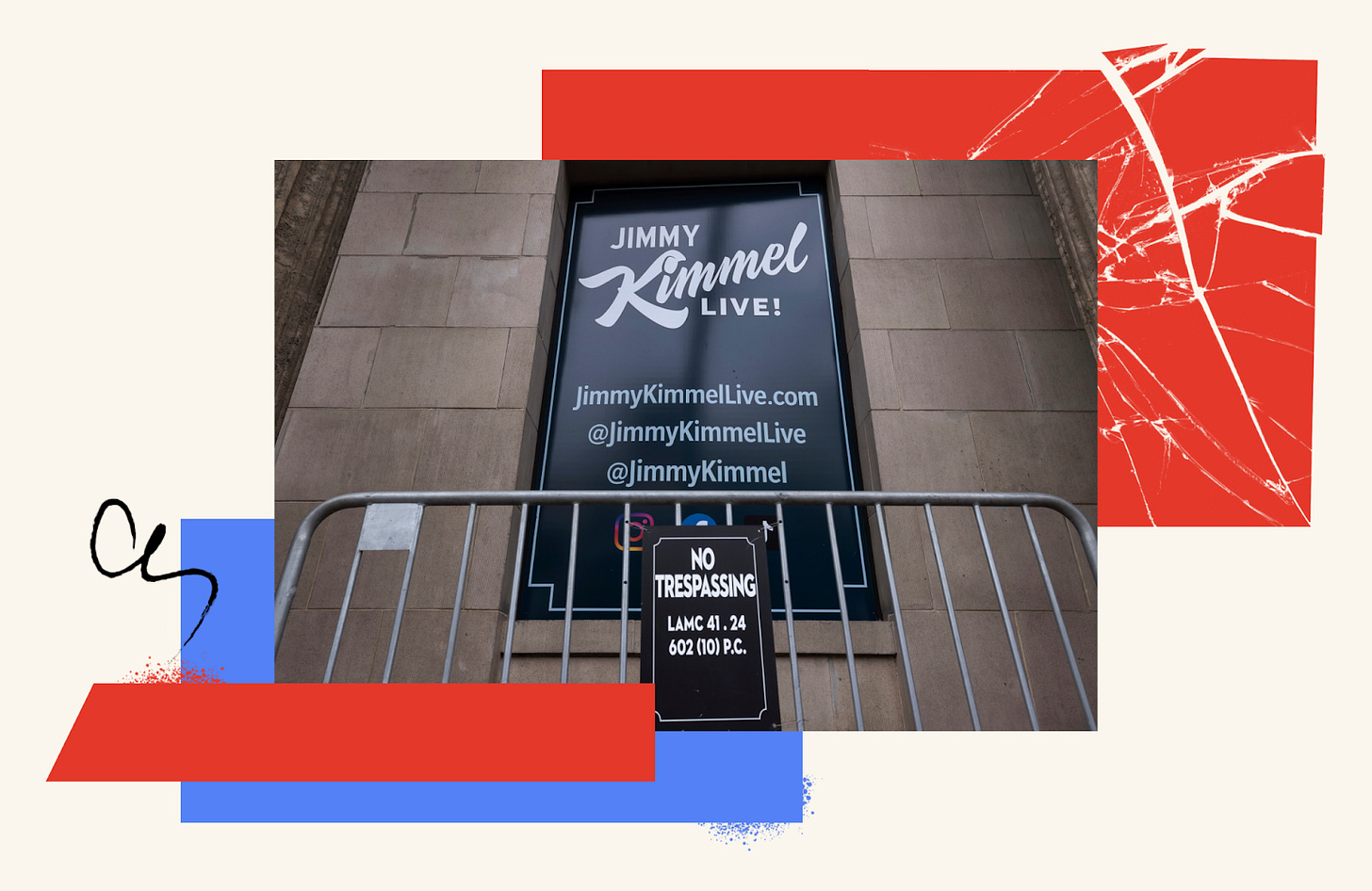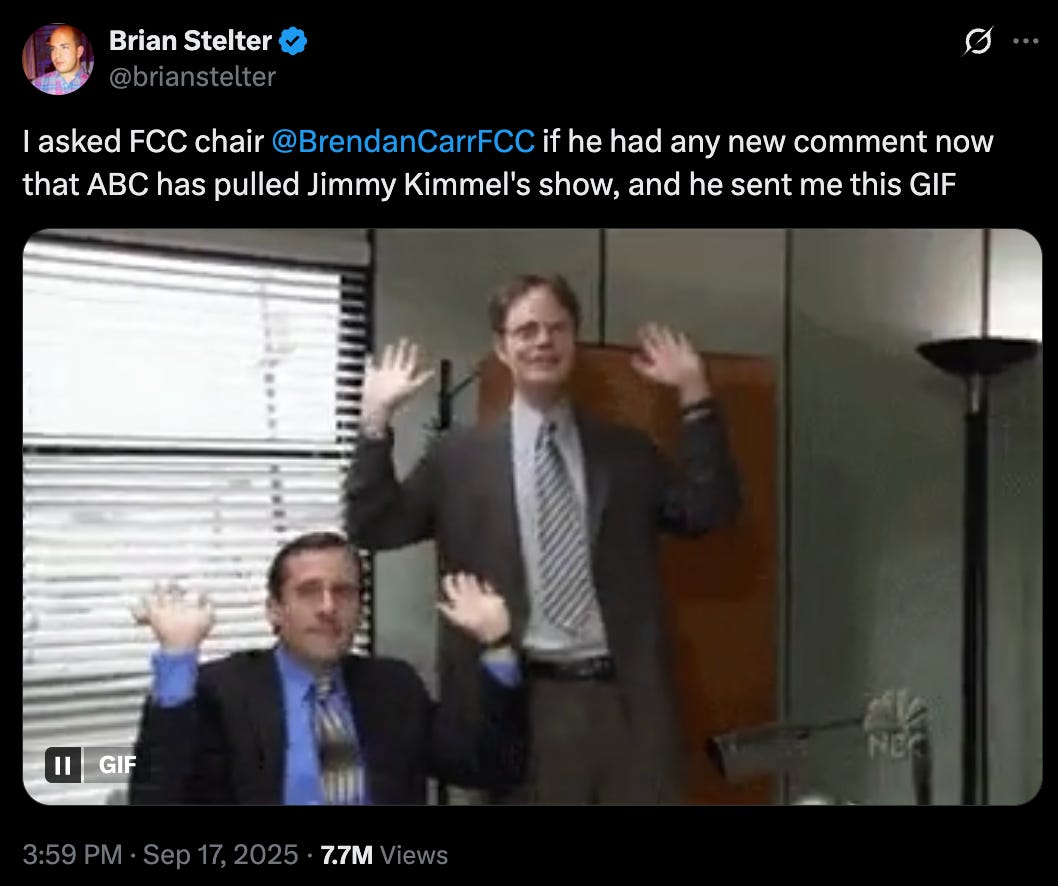The FCC vs. the Constitution
Plus, how Congress can step in to stop the rapidly escalating censorship
Yesterday, on the Constitution’s 238th birthday, the president’s chief ideological enforcer attempted to rip out its most central protection: the First Amendment.
Here’s what happened in simple terms:
Comedian Jimmy Kimmel, in a monologue on Monday, made remarks that FCC Chairman Brendan Carr, Trump’s self-appointed ideological sheriff, considered politically offensive.
Carr threatened to use the commission’s broad regulatory powers to retaliate against Kimmel’s corporate bosses at ABC and Disney.
Fearing the consequences, those corporate leaders dutifully obeyed. Kimmel was suspended indefinitely.
This sort of overt censorship, what legal experts call jawboning — when state actors use threats to inappropriately compel private action — is blatantly illegal. There is no ambiguity. (Good luck finding a reputable First Amendment lawyer anywhere in the country who would even think twice about it.)
Disney’s lawyers surely know this — they understand that such threats are patently unconstitutional. Yet Disney CEO Bob Iger obeyed anyway. That is a very ominous sign.
The Trump administration and the FCC have dropped any pretext of legality or constitutionality. They have made it clear that the coming campaign to censor and retaliate against any perceived ideological enemies in the aftermath of Charlie Kirk’s assassination will have no basis in law and will violate the Constitution. And now powerful people like Bob Iger are behaving as if they will succeed, as if the law no longer protects even the most powerful voices in our society from government
Unless all of us — Congress, civil society, the media, business leaders, and everyday citizens — act quickly and collectively, we may soon find our most cherished constitutional rights and freedoms to be as flimsy as the 238 year-old-paper they are written on.
On that front, two glimmers of hope:
First, the backlash to Carr and the White House’s growing censorship campaign has been swift, unequivocal, and increasingly bipartisan. Here are condemnations from The Free Press, Karl Rove, The Wall Street Journal editorial board, and, yes, Tucker Carlson.
Second, congressional leaders announced a legislative effort that would dramatically curtail any president’s ability to use the federal government to unconstitutionally target, censor, and retaliate against political enemies. This law would help protect all of the nonprofits, businesses, schools, and other perceived political opponents that this (or any future) administration may target for personal and political gain.
More about the NOPE Act at the bottom.
The FCC has become a weapon of ideological censorship
Congress created the FCC to regulate broadcast communications and to ensure they are available to all the people of the United States. Under Chairman Carr, the FCC has transformed itself into the White House’s chief censorship office. Most visibly, it held up a proposed merger between Paramount Global and Skydance Media until CBS News and 60 Minutes capitulated to the White House.
The administration’s leverage over corporate mergers also seems to be at play here — not just in one merger, but three. The two largest TV station owners in the country, Nexstar and Sinclair, both have potential mergers pending before the FCC and were quick to pull Kimmel’s show from local markets. Disney, too, has a potential merger in the works as it seeks to acquire Fubo, with the Justice Department currently investigating.
Less visibly, the FCC has also opened investigations into ABC and NBC; investigated a California radio station (owned by George Soros-backed Audacy) for its coverage of an ICE raid; threatened to investigate PBS and NPR over sponsorship practices; and made demands from Comcast, NBCUniversal, Disney, and ABC related to their DEI programs.
(All of this is a key authoritarian tactic. Threatening regulatory retaliation against individual outlets was key to how Viktor Orbán and his allies consolidated power over the press in Hungary.)
This campaign has been so alarming that a bipartisan group of former FCC commissioners were compelled to speak out, commenting in an official proceeding on the commission’s efforts against CBS News:
From our many combined years of experience as Commissioners, we cannot stay silent. The Commission on which we served, regardless of the party of its Chair or the policy agenda of the President, was an independent agency. It contains a bipartisan group of five commissioners due to the sensitive nature of regulating broadcasters, and the critical role they play in free press and free speech, the bedrock foundations of our democracy. It was dedicated to ensuring that the broadcast spectrum helped to create the marketplace of ideas that undergirds political debate and ensures the richness of American culture. We have taken great pride in the Commission’s historic bipartisan commitment to that position.
To remain true to its mission, the Commission must close this proceeding without further action. To do otherwise would suggest that the Commission has been transformed into a tool of White House-driven speech suppression.
[Read their full comments.]
Just last year, the Supreme Court affirmed that this sort of jawboning is illegal in a case called NRA v. Vullo.
Justice Sotomayor, writing for a unanimous 9-0 Court:
[W]here, as here, a government official makes coercive threats in a private meeting behind closed doors, the “ballot box” is an especially poor check on that official’s authority. Ultimately, the critical takeaway is that the First Amendment prohibits government officials from wielding their power selectively to punish or suppress speech, directly or (as alleged here) through private intermediaries.
The opinion also noted that jawboning allows the government to be more “effective” in “speech-suppression efforts because intermediaries will often be less invested in the speaker’s message and thus less likely to risk the regulator’s ire.” So here: the targeted intermediary, like others, has opted not to vigorously defend speech rights in court.
Businesses play right into the censorship campaign by capitulating. Disney likely felt too vulnerable, and suspending Kimmel seemed safer than trusting the courts would eventually protect their rights.1
Certainly Brendan Carr seems to be acting as if this is a power play unconnected to the law or Constitution. Here’s what he reportedly texted when asked for comment.
Unless something changes, the path we’re on ends in a very dark place.
Which is where the NOPE Act would come in.
A new proposed law would tightly constrain censorship efforts
The crackdown on speech violates our Constitution and laws. Full stop.
We shouldn’t need new laws to prevent it.
But in a situation where the government is seeking to circumvent basic constitutional principles, Congress can step in to insist the law be observed. And today, a group of lawmakers announced plans to introduce legislation to strengthen and clarify existing law and give those who are targeted better tools to push back on censorship and retaliation.
The No Political Enemies (NOPE) Act has five major components. Per the sponsors, it would prevent the targeting of individuals or organizations on the basis of their constitutionally protected speech, beliefs, and political participation by:
Reaffirming our Constitution and laws prohibit the president from weaponizing government against people who disagree with the administration. Uphold foundational constitutional principles that protect free speech and political participation. The DOJ, FBI, IRS, and other government agencies cannot be used to silence or target people for criticizing the government with constitutionally protected speech.
Deterring government officials from abusing their power to silence or retaliate against critics. Deter misconduct by making clear there are consequences for violating federal civil rights laws and that federal officials can be held accountable for abuses.
Providing tools for those wrongly targeted to defend themselves in court, including meaningful access to evidence, correcting the imbalance of proof, having the legal costs to defend themselves covered, and allowing courts to quickly dismiss abusive actions.
Providing due process for any U.S. nonprofits the government attempts to label as criminal or terrorist organizations.
Improving transparency and accountability for federal agencies that seek to silence critics. Create mechanisms for improved reporting and accountability for government agencies so that officials who commit misconduct by abusing their power to censor or retaliate against critics can be held accountable.
As if to emphasize how badly we need action from the legislative branch, here is how Bloomberg summarized the executive branch’s views of the First Amendment as of today:
We have two choices: either act now, or accept this as our future.
As with Paramount and Skydance, this gamble may come up short. Appeasement and obedience just invite further coercion and censorship. Since Paramount settled, Carr has continued to turn the screws on CBS through a newly installed ideological “ombudsman.”








If things keep going the way they are going, we may need to ask Canada to start 'Radio Free USA' news station
Boycott ABC, Disney & Nexstar: Use this free app to call and cancel your service at any of their 235 affiliates
https://thedemlabs.org/2025/09/18/boycott-abc-disney-nexstar-use-this-free-app-to-call-and-cancel-your-service-at-any-of-their-235-affiliates/
On ABC firing Jimmy Kimmell: See how billionaire media barons are firing journalists to appease Trump: How To Fight Back Action Kit by boycotting specific ABC shows and more
https://thedemlabs.org/2025/09/17/billionaire-media-barons-fire-journalists-to-appease-trump/